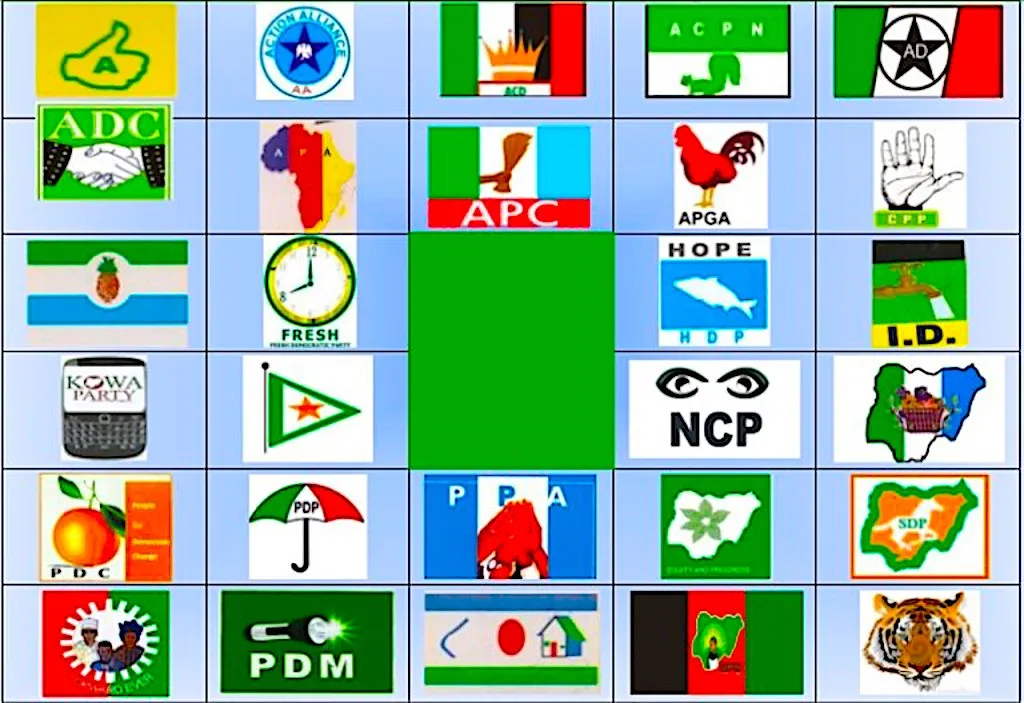Unleashing anarchy on political parties
The political actors, without exception, seem to have unleashed anarchy on the various platforms on which they came to power. Help take a count: all the leading political parties, the All Progressives Congress (APC), Peoples Democratic Party (PDP), and Labour Party (LP), are today all led by acting chairmen, and their party structures are in […]

The political actors, without exception, seem to have unleashed anarchy on the various platforms on which they came to power. Help take a count: all the leading political parties, the All Progressives Congress (APC), Peoples Democratic Party (PDP), and Labour Party (LP), are today all led by acting chairmen, and their party structures are in shambles. On the contrary, the various political actors who won elections are today all sitting pretty in their various offices making appointments into various government offices without any interfering inputs from the parties that brought them to power.
Just recall the experience of Abdullahi Adamu who recently resigned from the office of chairman of the APC. Ever since the party clinched the Presidency and a majority in the National Assembly with a similar showing in the states, he had been studiedly ignored. The president has been going about the business of government without any input from the former national chairman of the party. Even when Abdullahi Adamu stubbornly tried to intervene in the election of the Senate President and the Speaker House of Representatives, his directives, on behalf of the National Working Committee (NWC), on the APC’s preferred candidates were disregarded. He was seen to be an interloper and a busybody.
In the National Assembly leadership elections, the president openly campaigned for candidates opposite to the ones the Abdullahi Adamu-led NWC rooted for. As expected, the candidates supported by the president won hands down. It was obvious that there was no synergy between the party leadership and the presidency. I guess that would be the last straw. With a hostile president enjoying his newfound powers and without allies in the National Assembly, Abdullahi Adamu must have ruminated over these happenings and the consequences that would follow, before writing a letter of resignation and finally throwing in the towel.
- NIGERIA DAILY: What Will Happen If Tinubu Fails To Present Ministerial List This Week?
- Foundations launch campaign against memory loss by old people
But how and why Abdullahi Adamu, one of the most experienced politicians among the lot got himself into this fray? He had been in politics for as long as many of us can remember. In 1978, he was the secretary of the National Party of Nigeria (NPN) in Plateau (when it encompassed what is now Nasarawa State) and became the chairman of the party three years later. He never looked back, always participating in political activities throughout the 1980s and 90s during those long years of military rule. He was even a minister during the General Abacha years. At the return of civilian rule, Abdullahi Adamu was voted Governor of Nasarawa State and became a fixture in the country’s political firmament.
For one with such a pedigree, it was unthinkable for the kinds of debilitating wrong turns he took en route to the primaries of the 2023 election. The APC presidential primaries were a muddle, with the chairman coming out at the direst moment on the side of one of the candidates as the preferred candidate. When the preferred candidate failed to win, the chairman lost face from that moment. And when the party’s candidate won the presidential elections, it was a foregone conclusion that Abdullahi Adamu would become a lame duck. Politicians have long memories. They never forget, and they don’t forgive either. The tragic end unravelled as expected.
Going down memory lane, the fate of the past APC chairmen had always had this kind of predictable end. The first substantive chairman John Odigie-Oyegun and his successor, Adams Oshiomhole suffered the same end. They were all removed in uproarious conventions. Governor Mai Mala Buni of Yobe State, who took over from Oshiomhole as a caretaker chairman had a surprisingly long and peaceful tenure. However, despite Governor Buni’s famed even temper and his record of bringing peace to many state chapters of the party, the end of his tenure was not exactly smooth.
The PDP, the oldest party of the lot, had always had a record of bumpy tenures for its chairmen. The last chairman, Iyorchia Ayu, had the bumpiest ride of all. The problems he had with key stakeholders of the party led them to stand askance from the party which arguably made the PDP candidate lose the last presidential election. With the elections settled, the party did not hesitate to get rid of Ayu. The damage, however, runs deep in the party as those rebellious party stakeholders are yet to return to the party.
The situation in the LP could even be worse as the contestants for the party leadership, Lamidi Apapa and Julius Abure, are still in court to wrest the party leadership. The LP is lucky though, that Peter Obi, the presidential candidate, despite the crisis in the party, had the personal charisma to unite them behind him to give a good showing in the election.
Where do we go from here? From my perspective, a strong party structure with predictable tenures for its executives is essential to the survival of our democracy. A firm party headquarters, as with the judiciary and the national and state assemblies, could be one more check on executive recklessness. We can’t continue to treat the political parties like we do local governments and expect a viable democracy. Anarchy at the top of all our leading political parties is regrettable and their leaders need to go into some collective deep introspection to find a solution.
